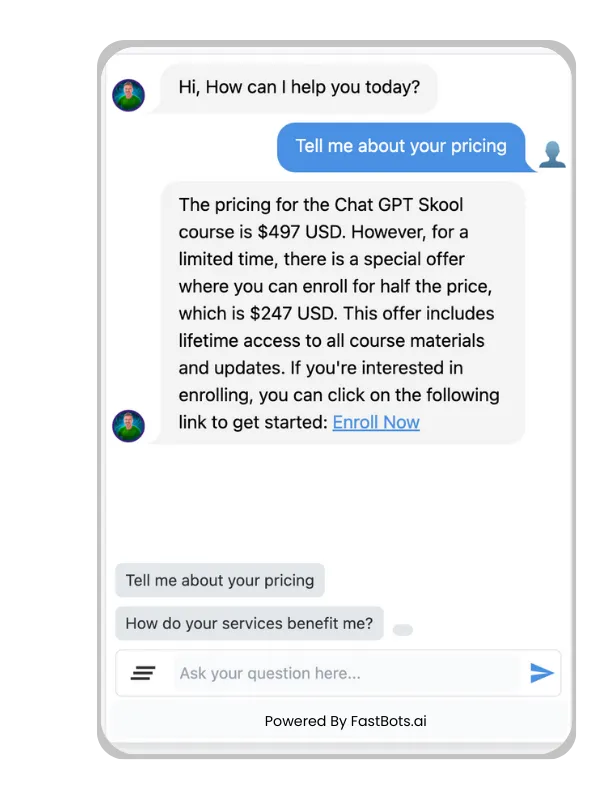Medical AI chatbots represent a revolutionary leap in the intersection of healthcare and technology. As a patient or healthcare provider, you may increasingly encounter these sophisticated algorithms designed to assist with a variety of tasks, ranging from symptom checking to patient triage. These chatbots utilise advanced artificial intelligence to interact in a human-like manner, providing responses and recommendations based on the vast medical knowledge they have been trained on.
The implementation of chatbots in healthcare seeks to enhance the patient experience and streamline the workload for medical professionals. You can leverage these tools for immediate answers to health-related questions, thus reducing waiting times and potentially alleviating the strain on medical facilities. Chatbots are tailored to meet diverse needs in healthcare; for example, some are specialized in offering emotional support while others focus on aiding with diagnosis or managing chronic diseases.
Your involvement with these AI-powered systems could vary; you may use them on a healthcare provider's website to understand your symptoms better or interact with them via a telehealth service to receive medical advice without leaving your home. These platforms are continuously learning and evolving, aiming to provide accurate, accessible, and efficient healthcare assistance, ensuring that the help you receive is reflective of the most current medical research and practices.
BUILD YOUR OWN MEDICAL AI CHATBOT
In less than 5 minutes, you could have an AI chatbot fully trained on your business data assisting your Website visitors.
Fundamentals of Medical AI Chatbots
Medical AI chatbots are sophisticated tools designed to facilitate interaction between healthcare providers and patients. They function by employing natural language processing (NLP) and machine learning to understand and respond to human language, enabling conversational engagement. Here are their core components:
- NLP Capabilities: This allows chatbots to comprehend text and voice commands, making interactions intuitive.
- Machine Learning: Over time, your chatbot learns from interactions to provide more accurate responses.
When integrated into healthcare settings, AI chatbots can serve various roles, including:
- Patient Triage: They can assess symptoms and direct patients to appropriate care.
- Information Repository: They provide patients with information about diseases, treatments, and medications.
Data security and privacy are paramount, given the sensitive nature of medical data—compliance with regulations like HIPAA in the U.S. is essential.
Implementation Considerations
- Scope of Knowledge: Ensure your chatbot has a comprehensive database to draw from.
- Accuracy: It must provide information based on current medical knowledge.
- FDA Approval: If operating independently, chatbots may require FDA review.
Training your chatbot with a diverse set of scenarios can greatly enhance its performance. Despite their advantages, remember that AI chatbots should support, not replace, healthcare professionals.
Design Principles for Medical AI Chatbots
In developing medical AI chatbots, you'll need to focus on key areas that ensure effective communication, safeguard patient information, and enhance the overall user experience.
User interface and user experience
Your chatbot's user interface (UI) must be intuitive and accessible, allowing users of varying technical skill levels to interact with it effectively. Clarity and simplicity are paramount; avoid medical jargon and opt for a clean layout with responsive design elements that adapt to various devices. A successful user experience (UX) hinges on the chatbot's ability to engage users in a way that feels natural and supportive.
Patient data privacy and security
You are responsible for incorporating robust security measures to protect patient data. Adherence to HIPAA or equivalent standards is not negotiable. Encrypt patient data both at rest and in transit. Regular security audits and compliance checks must be a part of your development lifecycle to maintain the integrity of patient information.
Conversational Flow and Natural Language Processing
Your chatbot must have a sophisticated conversational flow and utilise Natural Language Processing (NLP) to interpret and respond to a wide range of medical queries with high accuracy. Train your chatbot with diverse datasets to handle various dialects and colloquialisms, ensuring it can understand and simulate empathetic dialogue while providing medically accurate responses.
Implementation of Medical AI Chatbots
Medical AI chatbots are increasingly being utilized to enhance patient care and reduce the burden on healthcare systems. Their implementation requires strategic integration with existing healthcare infrastructure and adherence to strict medical regulations.
Integration with Healthcare Systems
You'll find that successful implementation of medical AI chatbots involves seamless integration with existing healthcare systems. This process includes:
- Ensuring interoperability: Your chatbots must be able to communicate effectively with electronic health records (EHRs) and other digital health platforms.
- Customisation to fit specific needs: Providers should tailor chatbot interactions to address users' health questions and guide them through the healthcare system’s services.
- Scalability: As demand grows, your chatbot infrastructure should be able to expand without losing performance.
Compliance with Medical Regulations
When you implement medical AI chatbots, compliance with medical regulations is crucial. Key points include:
- Data protection: Ensure that chatbot platforms are compliant with HIPAA in the U.S. or GDPR in the EU to maintain patient data privacy.
- Risk management: Regularly assess chatbots to identify and mitigate any risks in diagnosis or treatment advice.
- Clinical validation: Work with medical professionals to validate the accuracy and reliability of information provided by your chatbot.
Use Cases of Medical AI Chatbots
Medical AI chatbots serve as technologically advanced tools that enhance patient care and healthcare operations. They offer direct applications in triage, diagnostic processes, treatment monitoring, and information dissemination.
Patient Triage and Diagnostics
You'll find AI chatbots being utilized for initial patient triage and diagnostic support. By analysing the symptoms you report, these chatbots can prioritise medical cases based on urgency. In cases of common illnesses, they provide potential diagnoses, guiding you to appropriate care without the need for immediate hospital visits. This streamlines the process for both you and healthcare providers, ensuring you receive timely and relevant care.
- Example: A chatbot assesses symptoms and suggests that a patient with flu-like symptoms rest at home while someone with signs of a heart attack is advised to seek immediate care.
Personalised treatment and monitoring
AI chatbots offer personalised follow-up care and monitoring. If you're managing a chronic condition, chatbots can help track your symptoms and medication intake and can even remind you to adhere to your treatment plan. They adjust recommendations based on the data you provide, offering a tailored healthcare experience.
- Example: A chatbot sends daily reminders to a diabetic patient to check blood sugar levels and logs this information for review by healthcare professionals.
Health Information Dissemination
Your access to reliable health information is critical. AI chatbots serve as an efficient means for disseminating vital health information. They provide you with answers to medical questions, clarify treatment plans, and give updates on disease outbreaks or health policies, ensuring you stay informed.
- Example: The chatbot informs you about the latest COVID-19 guidelines or vaccination schedules based on your location.

Challenges and Ethical Considerations
In the rapidly advancing field of medical AI chatbots, you must navigate through a complex web of challenges and ethical considerations to ensure responsible use and deployment.
Bias and fairness
- Bias: AI chatbots are trained on datasets that may not be representative of all population demographics. This can lead to biassed outputs that favour certain groups over others.
- Fairness: Your imperative is to ensure that chatbots treat all users equitably, providing accurate and unbiased information regardless of background.
Responsibility and Accountability
- Responsibility: You are expected to implement mechanisms ensuring AI chatbots serve health needs without causing harm.
- Accountability: In cases where AI chatbots contribute to adverse outcomes, it's crucial to have clear accountability frameworks to address any consequences.
Transparency and explainability
- Transparency: Your AI chatbots should be transparent about their level of autonomy and the scope within which they operate. Users should be informed of the AI's capabilities and limitations.
- Explainability: You should guarantee that the decisions made by AI chatbots can be understood and interpreted by users. Without transparency, trust in these advanced systems can be eroded.
Frequently Asked Questions
In this section, you'll find concise answers to some of the common questions regarding the use of AI chatbots in the healthcare industry.
What are the benefits of using AI chatbots in healthcare?
How reliable are AI chatbots for medical diagnosis?
Can AI chatbots in healthcare maintain patient confidentiality?
What are the capabilities of AI chatbots in mental health support?
How do AI healthcare chatbots integrate with existing medical systems?
What are the limitations of using AI chatbots in medical settings?
THE EASIEST WAY TO BUILD YOUR OWN MEDICAL AI CHATBOT
In less than 5 minutes, you could have an AI chatbot fully trained on your business data assisting your Website visitors.


